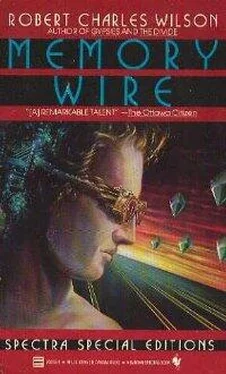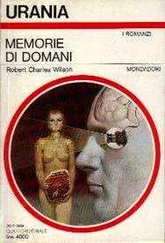Robert Wilson - Memory Wire
Здесь есть возможность читать онлайн «Robert Wilson - Memory Wire» весь текст электронной книги совершенно бесплатно (целиком полную версию без сокращений). В некоторых случаях можно слушать аудио, скачать через торрент в формате fb2 и присутствует краткое содержание. Год выпуска: 1987, ISBN: 1987, Издательство: Bantam Spectra, Жанр: Фантастика и фэнтези, на английском языке. Описание произведения, (предисловие) а так же отзывы посетителей доступны на портале библиотеки ЛибКат.
- Название:Memory Wire
- Автор:
- Издательство:Bantam Spectra
- Жанр:
- Год:1987
- ISBN:978-0-553-26853-9
- Рейтинг книги:4 / 5. Голосов: 1
-
Избранное:Добавить в избранное
- Отзывы:
-
Ваша оценка:
- 80
- 1
- 2
- 3
- 4
- 5
Memory Wire: краткое содержание, описание и аннотация
Предлагаем к чтению аннотацию, описание, краткое содержание или предисловие (зависит от того, что написал сам автор книги «Memory Wire»). Если вы не нашли необходимую информацию о книге — напишите в комментариях, мы постараемся отыскать её.
Memory Wire — читать онлайн бесплатно полную книгу (весь текст) целиком
Ниже представлен текст книги, разбитый по страницам. Система сохранения места последней прочитанной страницы, позволяет с удобством читать онлайн бесплатно книгу «Memory Wire», без необходимости каждый раз заново искать на чём Вы остановились. Поставьте закладку, и сможете в любой момент перейти на страницу, на которой закончили чтение.
Интервал:
Закладка:
Well, Byron thought. He had seen Teresa do her trick with the old people who visited her float: pulling the past out of a stone. Strange but not world-shaking. He told Wexler so.
“But it begs the question,” Wexler said. “Our best estimate now is that the Exotics encountered our planet some thousand years before the birth of Christ. It fascinated them. It must have. They would have asked themselves the questions we’ve been asking about them: how are these creatures like us? How are they not?”
He sipped his coffee, momentarily breathless. Byron waited.
“My guess,” Wexler said, “is that they considered us defective. Suppose we traveled to another world and encountered a race of myopics. That’s how it must have seemed to them. Here we are, obviously sapient, tool-using, clever individuals. Our bodies are not unlike theirs; we have opposable thumbs, as they do. The distinguishing feature is …” He tapped his forehead. “ Memory.” He smiled faintly. “The best evidence now suggests that the Exotics possessed what we would call eidetic memory. A human mind can’t do this; the few cases of human mnemonism on record have been deeply disturbed individuals. It’s the way we’re wired. We have to assume the Exotics could forget, in the sense that the past was not always vividly in their mind—no living creature could cope with that. But there was no fully experienced moment that could not be recalled at will… or could be willfully or permanently suppressed. Presumably, this is what fueled their obsession with information technology. For them, the idea of forgetting was indistinguishable from the idea of death. To pass out of memory was to pass out of the world. To conserve memory was to confer immortality.”
Byron walked with Wexler out along the seawall for a distance.
It was more private out here. The ocean seemed to lend a credibility to all this talk of time, immortality, memory.
Byron believed most of it. The talk had ignited an old enthusiasm in Wexler’s lined face, too immediate to be faked. None of this addressed the problem of betrayal, money, Teresa. But he was content, for now, to let the man talk.
“I wanted one of these new stones, of course. It seemed to me we could do so much with it. They used human subjects in Virginia, but usually the criminally insane, and they were reacting badly to the experience—hypermnesia, specifically of repressed material. Whereas in Carmel the response was almost always positive … at least with the traditional ’liths. Why not these new ones? It would be bigger, stronger, better. Real contact this time. Contact with an alien sapience: I cannot communicate how intoxicating that idea was. Not the exchange of mathematics, but real contact—spiritual contact.”
Byron said coolly, “Spiritual?”
The faint smile again. “I used to be freer with words like that. But yes, spiritual. It was what we wanted. The authentic touch. Across that chasm.” He waved his hand at the sky. “But of course everything was locked up very tight. The Agencies were scared of this whole thing. For the last thirty years national governments have been presiding over some fairly tumultuous social changes. A direct product of the oneiroliths. Fortunes made and unmade. That kind of instability is frightening. The idea of accelerated change—well, it made them nervous.”
“So you set up the buy at Pau Seco.”
“I really believed it would be safe. I spent a considerable amount of money on it. I bought cooperation at the highest levels of the SUDAM bureaucracy. There was a risk involved, of course. I told Teresa so when she volunteered. But even if there had been legal trouble, I might have bought you out of that too … the Valverde regime is extremely pliable.”
“It was worse than that,” Byron said.
Wexler averted his eyes. “So I understand. My contact in Virginia was compromised. And then the estate at Carmel was compromised. And so the house of cards came tumbling down. I have no influence over the Agencies … I didn’t know they would be involved.” He looked at Byron. “You managed to get away with the stone?”
“Yes.” No point in hiding it now.
“You have it still?”
He nodded.
“Has Teresa used it?”
“Yes.”
“Her reaction was not positive?”
“No,” Byron said.
Wexler nodded, registering the information. He looked back at the sea. The sea was wide and deep, Byron thought, and it went on forever. Like the sky. Like the stars.
“I don’t think they wholly understood us,” Wexler said. “The Exotics, I mean. They gave us the stones, and they were a gift, hidden until we could usefully decode and reproduce them. Binary code propagating across axes of symmetry. Micro voltages trickling down folded spacetime. But with this other aspect…” He smiled again—sadly now, Byron thought. “ ‘Spiritual.’ I think they simply wanted to make us whole … to cure what they saw as our tragic failure. Failure of memory. Which is failure of conscience. They were surprised, I would guess, by our capacity for aggression. For ruthlessness, for inflicting pain. Conscience is memory… and the stones would restore it.”
“But it doesn’t work that way.”
“I think because we are divided against ourselves in a way they could not imagine. We suppress memories; the memories lead a life of their own. We create images of ourselves and the images spring to life. We have names for them. The conscious and unconscious mind. Id and ego. And so on. Always, the crucial act is the act of forgetting. To be forced to confront the past, really confront it…” He shook his head. “It would take a great strength.”
“I’m worried about her,” Byron said.
Wexler said quietly, “I can’t help you.”
The sun was low in the sky when they turned away from the ocean.
“If you had the stone,” Byron said, “if you had it now, what would you do with it?”
Wexler moved like an old man. In this light, he was not inspiring. He walked with his legs bowed, his head down. “I don’t know,” he said.
“Would you touch it?”
“I don’t know … I don’t think so.”
“Why not?”
He was a long time answering. His lips were pursed, his gaze abstracted. “Maybe,” he said, “there are things I would like not to remember.”
“Like what?”
Silence.
Byron said, “You were the only one who knew. You were the one who sent us to Pau Seco, and you were the one who made the arrangements. Nobody else knew.”
His voice was faint now, tremulous. He said, “Suppose I lied. Suppose I was arrested in the sweep. Suppose I was interrogated by the Agencies.” He closed his eyes. “Suppose I was afraid, and suppose that—because I was afraid—I confessed, I told them about the arrangements I’d made in Brazil. And suppose, because I told them, they let me go.” His smile now was bleak and humorless. “Wouldn’t that be something I might like to forget?”
By the time they reached the cafe, night had fallen, the air was cool, and most of the tables were empty. Wexler ordered a drink; Byron said he had to get going.
“I can tell you one thing that might be useful,” Wexler said.
Byron waited. The beaten look on Wexler’s face had begun to make him nervous.
“I still talk to people at the Virginia facility,” he said. “There are a few untapped bit streams, if you know where to find them. The news now is that the Agencies have cooled off a good deal. The stone left Pau Seco, and they are not interested in tracing it. They decided it doesn’t have a big future on the black market-^-and from what you say, that is probably true. The issue is dead, except that they’ll install a military force at Pau Seco to oversee the Brazilians.
Читать дальшеИнтервал:
Закладка:
Похожие книги на «Memory Wire»
Представляем Вашему вниманию похожие книги на «Memory Wire» списком для выбора. Мы отобрали схожую по названию и смыслу литературу в надежде предоставить читателям больше вариантов отыскать новые, интересные, ещё непрочитанные произведения.
Обсуждение, отзывы о книге «Memory Wire» и просто собственные мнения читателей. Оставьте ваши комментарии, напишите, что Вы думаете о произведении, его смысле или главных героях. Укажите что конкретно понравилось, а что нет, и почему Вы так считаете.












